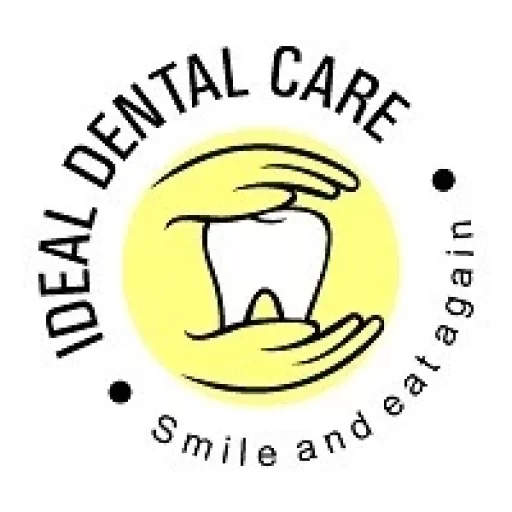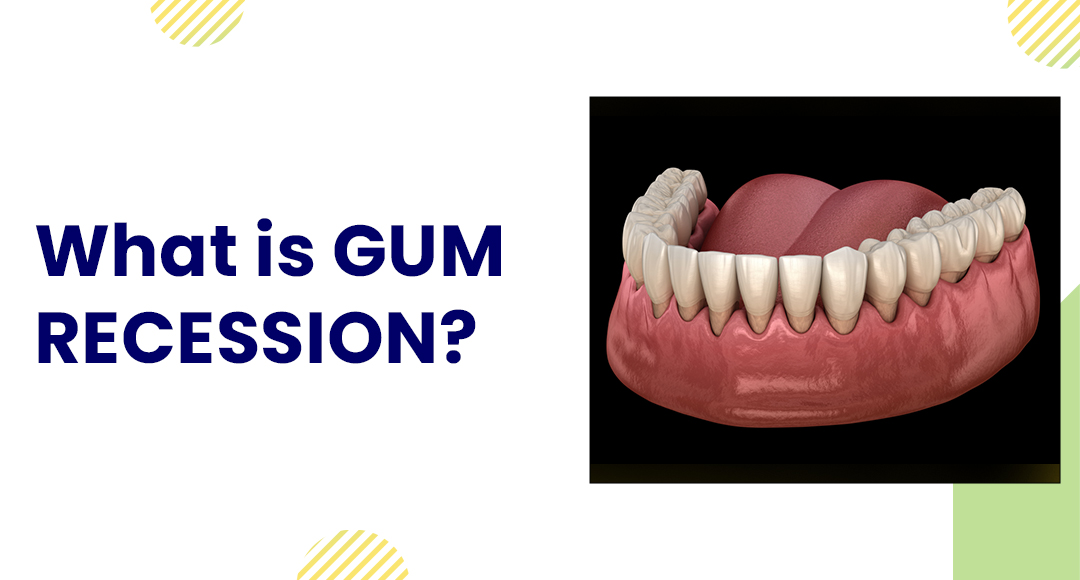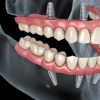WHAT IS GUM RECESSION?
Receding gums are a health concern because they expose the teeth to infection, decay, and loss. Gum of teeth can wear away or get pulled back, exposing the tooth roots. If a tooth is in an irregular location, the gums may retreat around it. Those who begin treatment early may be able to stop or reverse the recession of gums.
Receding gums is a common problem, although many people are unaware that their gums are receding until they reach a severe stage. Several treatments are available if recession gums are significant and cause symptoms such as tooth discomfort, sensitivity, or infection. Infection treatment, deep cleansing, and tissue grafts are among the choices.
Gum recession occurs when the gum tissue of teeth pulls away from the teeth, revealing the roots beneath. Various factors contribute to it, including aggressive brushing, smoking, and even heredity. Read along to learn more! This blog tells you everything you need to know about the gum recession.
What is Gum Recession?
A gum disease occurs when gum tissue separates from teeth, exposing the roots beneath is called Gum Recession. This condition makes your teeth more prone to decay. During chewing or brushing, your teeth may become more sensitive. The recession of gums can be moderate, minor, or severe. It might affect a single tooth or a group of teeth.
Whom does Gum Recession affect?
While gum recession can occur at any age, it is most common in people in the age of 65 or above. You are more likely to experience a recession if:
- Periodontal disease exists.
- Braces or other orthodontic therapy were used.
- Chew tobacco is an option.
- Get your lip or tongue pierced.
- Clean your teeth vigorously.
How common is Gum Recession?
Gum recession on one or more teeth affects about 88% of adults over 65, making it a common disease.
What are the symptoms of the Gum Recession?
Tooth root exposure is the most noticeable indicator of gum recession. Additional indications of a gum recession include:
- Discomfort or pain along your gum line.
- Sensitive to heat, cold, and sweetness.
- When cleaning and flossing your teeth, you should be sensitive.
- During dental cleanings, sensitivity.
Gum recession, when left untreated, can result in additional major dental health issues like tooth movement, bone loss, or “wigglyness,” or even tooth loss. Make an appointment with dentists at Ideal Dental Care as soon as possible if you have any of the symptoms mentioned above.
What causes Gum Recession?
Many factors can cause your gums to recede. Causes of gum recession include:
- Excessively hard or harsh brushing.
- Dental tartar or plaque accumulation.
- Periodontal disease.
- Damage or trauma to the gum tissue.
- Unusual tooth placement (misalignment).
- Chewing or smoking tobacco.
- Tongue and lip piercings.
Gum recession is frequently caused by poor dental hygiene; however, this isn’t always the case. Several patients only have a hereditary propensity for thin gum tissue. Whatever the cause of your gum recession, prompt diagnosis, and treatment can help avoid serious issues with your oral health in the long run.
How is Gum Recession diagnosed?
Dentists at Ideal Dental Care can identify Gum recession during a routine examination. They’ll use a specialized tool called a periodontal probe to measure the degree of gum recession on each tooth.
In regions where the gums have receded, bone loss is frequent. Our dentist will thus additionally evaluate the size of the periodontal pockets surrounding each tooth. Healthy pockets range in size from 1 to 3 millimeters. Pockets with gingivitis are 4 millimeters in size. You will have pockets at least 5 millimeters deep if you have periodontal disease.
Can gums Grow back?
Receding Gums cannot grow back, unfortunately. Yet, you may take action to stop the gum recession from getting worse.
How do I reduce sensitivity caused by Gum Recession?
Pain or sensitivity are common symptoms of gum recession. It is due to the lack of protective enamel on your tooth roots. Cementum, which is their covering, could be more assertive. To lessen the discomfort caused by receding gums, Ideal Dental Care dentists may use fluoride varnish or other desensitising chemicals.
Desensitising toothpaste is another thing you may use at home. Also, our dental hygienist may utilise anaesthetics to make you more at ease while performing dental cleanings.
What’s the best toothpaste for gum recession?
Desensitising toothpaste can assist in reducing gum recession-related discomfort. It can take many weeks for desensitising toothpaste to start functioning, and it works best when used regularly.
Check for active components such as potassium nitrate, stannous fluoride, strontium chloride, and arginine. These chemicals soothe the nerves inside your teeth and give you healthy gums.
How do they fix receding gums?
Treatment for gum recession is primarily dependent on the underlying reason. Nonsurgical remedies, may help with mild occurrences of gum recession. Nonetheless, in most cases, gum recession surgery is required to resolve the issue entirely.
Nonsurgical Treatments
Nonsurgical treatments for receding gums include:
Dental Bonding
Dentists at Ideal Dental Care may occasionally use tooth-colored composite resin to conceal the recession. It covers your exposed tooth root, making it less obvious and more comfortable.
Orthodontics
Gum recession may result from pointed, crooked, or rotated teeth. Braces might be a possibility in these situations. The gum edge could gradually heal itself once the tooth has been realigned.
Gum Recession Surgery
The most reliable and durable treatment for gum recession is gum graft surgery. Usually, this operation is executed by a periodontist (gum expert). A gum transplant is employed during this procedure to replace your missing gum tissue. The graft used for the surgery is generally taken from the top of your mouth, while sporadically may originate from tissue from a sterile human donor.
Gum grafting treatments come in a variety of forms. Choosing the best one for your circumstances can be assisted by your surgeon. The surgeon sews the gum graft into place once it is in the perfect position. Gum grafting techniques today involve minimal discomfort. Visit Ideal Dental Care for a 100% painless procedure.
How long is the Recovery period from Gum Grafting surgery?
The recovery period from gum grafting surgery is determined based on where the gum graft came from, how many teeth were treated, and the sort of grafting surgery. Those who get gum recession surgery generally feel normal again in approximately two weeks.
You’ll receive thorough postoperative instructions from your surgeon. You should carefully follow these guidelines to ensure a comfortable, effective recovery.
Can I prevent a gum recession?
A Good care of teeth and gums can significantly lower your risk of infection-related gum recession. It is not always possible to stop gum recession, particularly if you are genetically predisposed to having thin gum tissue. For instance:
- Every day, brush your teeth thoroughly twice.
- Once per day, floss.
- Take an antibacterial mouthwash two times per day.
- Follow the advice of your dentist on dental cleanings. (Although many people only require cleanings every six months, some may require more frequent appointments.)
- Use a toothbrush with gentle bristles.
- Do not chew tobacco or smoke.
If you observe any indications of gum recession, consult a dentist.
What can I expect if I have a gum recession?
If your dentist sees minimal gum recession, they may recommend nonsurgical therapies such as dental bonding; however, they will guide you to a periodontist or oral surgeon for a consultation on gum grafting if you have medium to severe gum recession.
When should I see my dentist?
You can have gum recession if you notice that the roots of your teeth are more noticeable than they once were or if your teeth are more sensitive than usual. You should contact your dentist or periodontist at the first hint of issues. Your chances of achieving excellent dental health are improved if the earlier gum recession is identified and addressed.
Take Away
Gum recession can seriously harm your dental health if not treated in time. Dentists can explain the severity of the issue and the activities you can take to safeguard your dental health. If your gums are receding, you must undergo a dental evaluation even if you don’t have discomfort or irritation.
Ideal Dental Care provides expert dental care under one roof, from routine checkups to dental implant surgeries. Consult with our dentists today and avail 100% painless procedures. If you are a resident of Indore or planning to get your dental treatment done from Indore, then We are a perfect place for you.




